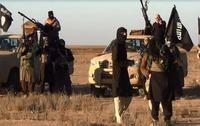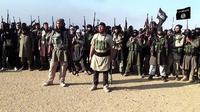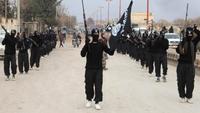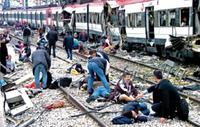-
Risks of terrorists attacking, or using materials from, a nuclear power plant are low: Experts

Energy analysts who support new nuclear power plants construction insist that the probability of a terrorist nuclear attack by land, sea, or air is extremely low. They reject arguments by nuclear power opponents that terrorist groups may one day attack a nuclear plant, or build an improvised nuclear bomb using materials stolen from a nuclear power plant – and that governments should, therefore, end construction of new nuclear power plants. Climate scientists supporting reduction in CO2 emissions wrote that “There is no credible path to climate stabilization that does not include a substantial role for nuclear power.”
-
-
Brainwashing and radicalization don’t explain why young people join violent causes
Why do young people from Western societies join ISIS? Terms such as “brainwashing” and “radicalization” are typically and casually invoked to explain the phenomenon. Suggestions of brainwashing or radicalization imply that the object of such efforts has been profoundly diverted from their usual, reasonable way of thinking. The instigators of this mental trickery are implicitly credited with considerable psychological skill, while the target is simultaneously assumed to have some mental insufficiency or vulnerability. The young are commonly deemed to be easy prey for those seeking to enlist them for a “radical” cause. The problem is, it’s just not that simple. Arguing that a 15 or 16-year-old is able to make a reasoned choice about engagement in hostilities risks exposing that young person to the full force of the law – but using loose, inadequate concepts such as brainwashing and radicalization to explain young people’s engagement in political violence carries its own risks. It severely limits our ability to understand why young people are mobilized in support of a group such as Islamic State, and hinders intelligent debate about the wider changes needed to prevent them doing so. Moreover our efforts to reintegrate them once they come back are likely to prove desperately inadequate.
-
-
Egypt thwarts terrorist attack on Israeli gas platforms in the Mediterranean Sea

Egypt said it had thwarted an attempt by Islamic State (ISIS)-affiliated Egyptian terrorists on 12 November to attack Israeli energy platforms in the Mediterranean Sea. The terrorists, members of the Ansar Bayt al-Maqdis terror group which operates in the Sinai Peninsula, commandeered an Egyptian navy missile boat for the planned attack. Other Egyptian navy vessels gave chase and stopped the commandeered missile boat, killing eight aboard in a heavy exchange of fire. In addition to attacking Israeli gas platform, the terrorists planned to attack Israeli ships.
-
-
Number of lone-wolf terrorist attacks in U.S. not rising, but police are targeted more often
Lone wolf terrorist attacks in the United States are not on the rise as popular culture might lead one to believe — but the attacks are changing for the worse, according to new research. The targets, weapons, and motives have changed in recent years. Before 9/11, these terrorists used bombs, but now high-velocity firearms are the weapon of choice, he said. The change might be a result of legislation enacted after the Oklahoma City bombing limiting the public’s access to bomb-making ingredients. Police and military personnel are now the preferred targets of modern lone wolf terrorists. Domestically, attacks on the power grid are the next big threat, the researchers say. Lone wolf terrorist Jason Woodring successfully downed the electric transmission system of rural Arkansas in 2013. His vandalism affected 10,000 people and cost $3 million in repairs.
-
-
ISIS says it is holding an Israeli woman pilot hostage

The Canadian government said yesterday (Sunday) said it was looking into reports that a Canadian-Israeli woman who joined Kurdish militias fighting in northern Syria has been captured by Islamic State (ISIS) fighters. Gill Rosenberg, 31, a former pilot who served in the Israeli Defense Force (IDF), reportedly joined Kurdish troops fighting ISIS earlier this month. Reports said she contacted Kurdish fighters through the Internet, then traveled to the Kurdish areas in Iraq to train at one of their camps on the Syrian border.
-
-
What makes a terrorist stop being a terrorist?

The journey into and out of terrorism is as personal as it is complex. De-radicalization programs still represent some of the most creative approaches to counter-terrorism. They can be powerful forces in thinning the ranks of lower-level members. But if we do not have a sincere discussion of why or how they work, their future will be in jeopardy. With rumors of hundreds of disillusioned ex-ISIS members exploring a potential return home, we are already way behind. We need clear thinking to underpin these programs and their evaluation. In the absence of transparency and clearer expectations, it will only take one-high profile failure (would any program survive if one of its graduates detonated a suicide bomb closer to home?) for the potential of these programs to be lost forever.
-
-
Campaigning against radicalization in Minnesota’s Somali community

Between 2007 and 2008, roughly two dozen Somali young adults left their homes in Minnesota to join al-Shabaab, a Somali-based al-Qaeda affiliate. In the past year alone, at least fifteen Somali men have traveled overseas to join the Islamic State (ISIS) in Syria and Iraq. The U.S. Attorney in Minnesota, Andy Luger, met with Somali community leaders on Monday to outline a campaign that includes job creation and after school programs to combat the root causes of extremism.
-
-
U.K. government's sweeping new counterterrorism bill unveiled today
The U.K. government unveils today (Wednesday) sweeping new measures to combat extremism and terrorism, and tackle radicalization, in the United Kingdom. Among other measures, the new counterterrorism bill will require schools and universities to exclude radical speakers from their campuses, and give the home secretary the powers to deny entry (or re-entry) to the United Kingdom to U.K. British citizens suspected of involvement in terrorism-related activity abroad. These citizens’ travel documents will be cancelled and their names placed on no-fly lists for up to two years. Home Secretary Theresa May said: “We are engaged in a struggle that is fought on many fronts and in many forms. It is a struggle that will go on for many years. And the threat we face right now is perhaps greater than it ever has been. We must have the powers we need to defend ourselves.”
-
-
Impasse in Congress over terrorism insurance (TRIA) renewal

The Terrorism Risk Insurance Act(TRIA) is expected to expire by 31 December unless Congress renews the legislation or places a temporary extension. The legislation, initially established in November 2002 as a federal backstop to protect insurers in the event an act of terrorism results in losses above $100 million, has been extended and reauthorized. The insurance industry supports the reauthorization approved by the Senate, and opposes a short-term extension. Some insurance companies have noted on their contracts that policyholders could lose terrorism coverage if TRIA is not renewed.
-
-
U.S. anti-ISIS campaign hindered by lack of reliable intelligence sources on the ground

U.S.-led airstrikes on the Islamic State (ISIS) and other militant groups in Iraq and Syria are hindered by a lack of credible intelligence sources on the ground, according to senior intelligence officials. “It’s a black hole,” one U.S. official saidaboutthe challenge of tracking terrorists and assessing casualties in a war zone limited to airstrikes. “We just don’t have the assets on the ground — that would have been one advantage of arming the Syrian moderates two years ago,” another expert said. “Syria is such a fluid environment, it would be very difficult to develop assets now.”
-
-
U.S. tracking 150 people who travelled to Syria – some of them “to fight” in ISIS ranks

U.S. law enforcement agencies are tracking about 150 people who traveled from the United States to Syria in recent months, “a significant number of them to fight,” FBI director James Comey told reporters at a briefing in Boston on Tuesday. The number of Americans who traveled to the Middle East to join the Islamic State (ISIS) is higher than figures mentioned earlier by U.S. intelligence and law enforcement of Americans who actually joined ISIS ranks. Last month, Comey said the FBI was aware of “a dozen or so” Americans fighting in Syria “on the side of the terrorists” – and he repeated that number on Tuesday, adding that the total number of travelers under surveillance is ten times that.
-
-
RAND study assesses threat posed by Americans joining jihadist fronts abroad
Although it is difficult to pin down the exact numbers of Western fighters slipping off to join the jihadist fronts in Syria and Iraq – the number is estimated to be around 100 — U.S. counterterrorism officials believe that those fighters pose a clear and present danger to American security. Some of these fighters will be killed in the fighting, some will choose to remain in the Middle East, but some will return, more radicalized than before and determined to continue their violent campaigns back in the United States.
-
-
Jerusalem attacks are no isolated incident: the third intifada is here
The attack on a Jerusalem synagogue in which four Jewish worshippers were killed and eight were injured has sparked new fears that fighting between Israel and Palestinian could flare up once more. The attack, by two Palestinians carrying meat cleavers and a gun, has the potential to kick off fresh religious confrontation and a third intifada. In the first intifada of 1987, the Palestinians rose up against the Israeli occupation of the West Bank and Gaza for the first time. The 2000 intifada followed a failed peace process. But this intifada is not being fought over territory or negotiating positions. It is a religious conflict that is bubbling up as a result of contrasting claims to sovereignty over the Holy City of Jerusalem. This intractable conflict has long been defined by issues such as the future of the Israeli settlements in the West Bank and the fate of Palestinian refugees. Now the added burden of more religious tensions is certain to condemn the people of the Holy Land to many more years of bloodshed.
-
-
ISIS has sufficient quantities of arms to carry on fighting for two years: UN

A new report prepared for the United Nations Security Council warns that Islamic State (ISIS) has in its possession sufficient reserves of small arms, ammunition, and vehicles to wage its war for Syria and Iraq for up to two years. The size and diversity the Islamist organization’s arsenal allow the group durable mobility, range, and a limited defense against low-flying aircraft. The report notes that even if the U.S.-led air campaign continues to destroy the group’s vehicles and heavier weapon systems, such a campaign “cannot mitigate the effect of the significant volume of light weapons” Isis possesses.
-
-
Number of deaths caused by terrorism in 2013 increased 61% over 2012

There were almost 10,000 terrorist attacks recorded in 2013 (representing a 44 percent increase over 2012), resulting in nearly 18,000 deaths (representing a 61 percent increase from the previous year). Twenty-four countries experienced more than 50 deaths in 2013, and increase of 60 percent from 15 in 2012. Terrorism in 2013 was dominated by four organizations: ISIS, Boko Haram, al Qaeda, and the Taliban — collectively responsible for 66 percent of all fatalities from terrorism. More than 80 percent of the deaths from terrorist incidents in 2013 were recorded in just five countries: Iraq, Afghanistan, Pakistan, Nigeria, and Syria. Iraq continues to be the country most impacted by terrorism, with the number of fatalities in the country rising 164 percent to 6,362. At least thirteen countries face a greater risk of significant terrorist activity in the coming years: Angola, Bangladesh, Burundi, Central African Republic, Cote d’Ivoire, Ethiopia, Iran, Israel, Mali, Mexico, Myanmar, Sri Lanka, and Uganda.
-
- All
- Regional
- Water
- Biometrics
- Borders/Immig
- Business
- Cybersecurity
- Detection
- Disasters
- Government
- Infrastructure
- International
- Public health
- Public Safety
- Communication interoperabillity
- Emergency services
- Emergency medical services
- Fire
- First response
- IEDs
- Law Enforcement
- Law Enforcement Technology
- Military technology
- Nonlethal weapons
- Nuclear weapons
- Personal protection equipment
- Police
- Notification /alert systems
- Situational awareness
- Weapons systems
- Sci-Tech
- Sector Reports
- Surveillance
- Transportation
Advertising & Marketing: advertise@newswirepubs.com
Editorial: editor@newswirepubs.com
General: info@newswirepubs.com
2010-2011 © News Wire Publications, LLC News Wire Publications, LLC
220 Old Country Road | Suite 200 | Mineola | New York | 11501
Permissions and Policies
Editorial: editor@newswirepubs.com
General: info@newswirepubs.com
2010-2011 © News Wire Publications, LLC News Wire Publications, LLC
220 Old Country Road | Suite 200 | Mineola | New York | 11501
Permissions and Policies
